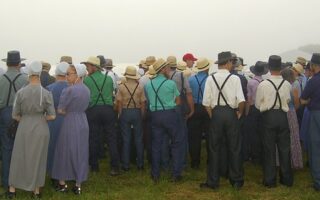The Bible does not explicitly state whether or not Jesus sang. However, there are several passages in the Bible that suggest that Jesus may have sung. In the Gospels, Jesus is described as being filled with joy and praising God. In the book of Psalms, Jesus is described as singing praises to God. Additionally, Jesus was a part of the Jewish culture, which was known for its singing and music. Therefore, it is likely that Jesus sang in some capacity.
Table of Contents
Examining the Biblical Evidence for Jesus Singing
Have you ever wondered if Jesus sang? It’s a question that has been asked by many people over the years, and it’s one that has no definitive answer. While there is no direct evidence in the Bible that Jesus sang, there are some passages that suggest he may have.
One of the most compelling pieces of evidence is found in the book of Luke. In Luke 15:25, Jesus is described as rejoicing and singing when a lost son returns home. This passage suggests that Jesus was not only capable of singing, but that he was also willing to do so in a moment of joy.
Another passage that could be interpreted as Jesus singing is found in the book of Revelation. In Revelation 5:9, Jesus is described as singing a new song before the throne of God. This could be interpreted as Jesus singing a song of praise to God.
Finally, there is the story of Mary and Martha in the book of Luke. In this story, Mary is praised for sitting at Jesus’ feet and listening to him, while Martha is scolded for being too busy with her chores. This could be interpreted as Jesus singing a song of comfort and encouragement to Mary.
So, while there is no direct evidence in the Bible that Jesus sang, there are some passages that suggest he may have. Whether or not Jesus sang is ultimately up to each individual to decide.
How Singing Was Used in Jesus’ Ministry
Singing was an important part of Jesus’ ministry. He used it to express his joy, to encourage his followers, and to spread his message of love and hope.
One of the most famous examples of Jesus singing is found in the Gospel of Luke. After the Last Supper, Jesus and his disciples sang a hymn together before Jesus went to the Garden of Gethsemane. This hymn was likely a psalm of praise and thanksgiving.
Jesus also used singing to teach his disciples. In the Gospel of Matthew, Jesus taught his disciples a song about the Kingdom of Heaven. This song was meant to help them remember the lessons he had taught them.
Singing was also used to spread Jesus’ message of love and hope. In the Gospel of Mark, Jesus sang a song of peace and joy to the crowds that had gathered to hear him preach. This song was meant to encourage them and remind them of the hope that Jesus brought.
Finally, Jesus used singing to express his joy. In the Gospel of John, Jesus sang a song of joy after he had performed a miracle. This song was meant to show his followers that he was filled with joy and that they should be too.
Singing was an important part of Jesus’ ministry. He used it to express his joy, to encourage his followers, and to spread his message of love and hope.
Exploring the Theological Implications of Jesus Singing
Have you ever stopped to consider the theological implications of Jesus singing? It may seem like a strange concept, but the Bible actually mentions Jesus singing on multiple occasions. In fact, the Bible tells us that Jesus sang a hymn with His disciples after the Last Supper (Matthew 26:30).
So, what does it mean that Jesus sang? Well, for starters, it shows us that Jesus was a man of joy and celebration. He was not a stoic figure who was always serious and solemn. Instead, He was a man who could laugh and sing and enjoy life. This is an important reminder for us today, as we often forget that Jesus was a real person with real emotions.
But there is more to it than that. Jesus singing also shows us that He was a man of worship. He was not just singing for fun; He was singing to God. This reminds us that worship is an important part of our relationship with God. We should not just be focused on the intellectual aspects of our faith, but also on the spiritual aspects.
Finally, Jesus singing reminds us that music is a powerful tool for expressing our faith. Music can be used to express joy, sorrow, love, and even our deepest theological convictions. So, the next time you are singing a hymn or worship song, remember that Jesus sang too.
The Role of Music in Jesus’ Teaching and Worship
Music has always been an important part of Jesus’ teaching and worship. From the time of his birth, music has been used to celebrate and honor Jesus. Throughout his ministry, Jesus used music to communicate his message and to bring people together in worship.
In the Gospels, we see Jesus singing with his disciples at the Last Supper. This was a powerful moment of unity and fellowship, and it was made even more meaningful by the music. Jesus also used music to teach his disciples. He often used parables and stories set to music to help them understand his teachings.
Music was also an important part of Jesus’ worship. He often sang hymns and psalms with his disciples. These songs were filled with praise and thanksgiving to God. They were also a way for Jesus to express his love for God and to draw people closer to Him.
Music was also used to celebrate Jesus’ life and ministry. After his resurrection, Jesus’ followers sang songs of joy and praise. These songs were a way to express their faith and to honor Jesus.
Music has always been an important part of Jesus’ teaching and worship. It was a way for him to communicate his message, to bring people together in worship, and to celebrate his life and ministry. Music is still an important part of Christian worship today, and it is a powerful way to honor Jesus and to express our faith.
Conclusion
In conclusion, there is no clear evidence that Jesus sang in the Bible. However, there are several passages that suggest that Jesus may have sung or at least been involved in singing. Ultimately, the answer to this question is up to individual interpretation.
For licensing reasons, we must provide the following notice: This content was created in part with the help of an AI.


